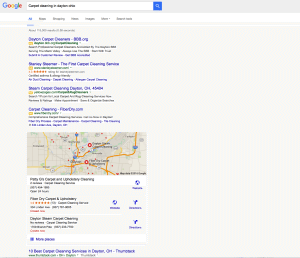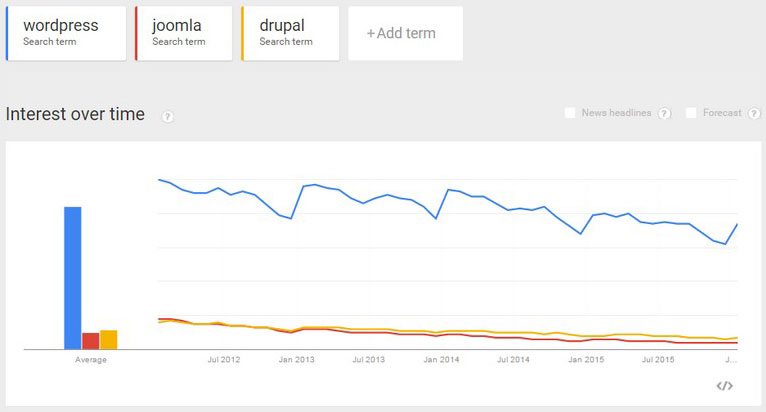70% of you ignored the first three results on Google, and never looked at the sponsored results in the right hand column.
So, as of Wednesday February 23, 2016, Google decided to do something about that.
Gone is the right hand column in it’s entirety.
Instead of three sponsored links at the top of the page- there are now FOUR.
Then a geographic map- listing Google Local results near you.
Then ten organic results, then three more sponsored search results.
All in the left hand column.
So, this means there are now at least 4 paid results above you- and then, the organic map, then ten results, some of which will almost always be manipulated link farm directories like the Better Business Bureau, Hibu, YP, Angies List, and who knows who else, then, if you are both lucky and good- you.
This means higher bids to be seen for the Search Engine Marketing people to make it into the top 4 positions, and a lot less paid spots on page one.
It also means a lot of white space. The good news, if they are actually searching for your exact business- it will probably show up all by itself on the right.
Time to make sure your Google Local listing is up to date.
Also, since last year, Google will give preference to sites that are both entirely secure (we now offer this as part of our hosting package) and mobile friendly (responsive, or other wise).
Some people speculate that this new Google format is mostly driven by the small screen, guaranteeing that search results, including ads, look the same on mobile as they do on desktop, others, think it’s just a way for Google to maximize revenue. Either way, it’s a big change, and will take some more time to fully understand how this changes your first page results.
Our completely committed endorsement of WordPress is no secret, you’ll hear from us on this website and in our seminar that WordPress is the best content management system for a business owner building their site. It’s at home with techies just as much as it’s easy to use for people who have a casual relationship with the web.
However, this doesn’t mean we live in a vacuum; we keep an open mind to new and other currently existing web technologies, as well. If something even better than WordPress were to appear that made website creation and maintenance easy while keeping up with tech trends and searchability, we’d try to be the first to tell anyone about it. To this end, we continue to keep up our knowledge with other content management systems like Joomla and Drupal, among others. The rest of the web has generally trended towards what makes sense, too, which is why WordPress makes up nearly half of all websites. Take a look at the following stats we gleaned from BuiltWith:
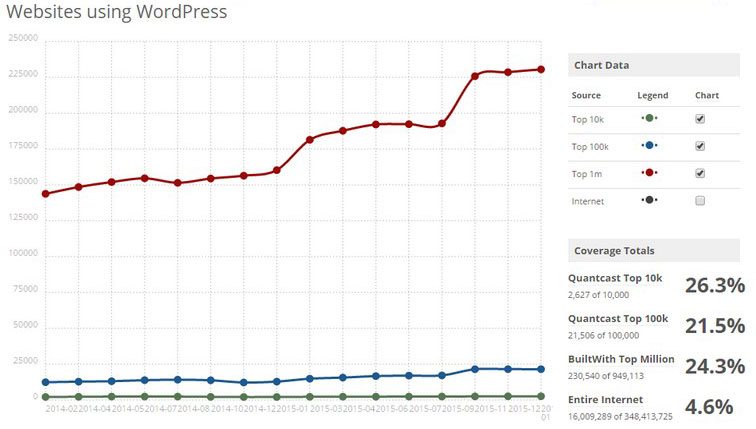
With 2016 getting started, it doesn’t look like we’re in any rush to change our 10 years of web content: WordPress is here to stay. Better yet, usage is increasing. As for the other big players—Joomla and Drupal—they’ve continued on a downward trend which has been going on for years (all 3 experienced a sharp increase in one month in 2015, likely a change in measurements).
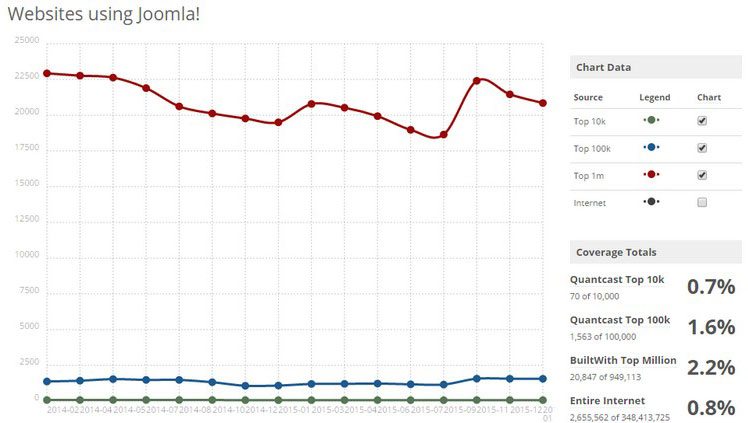
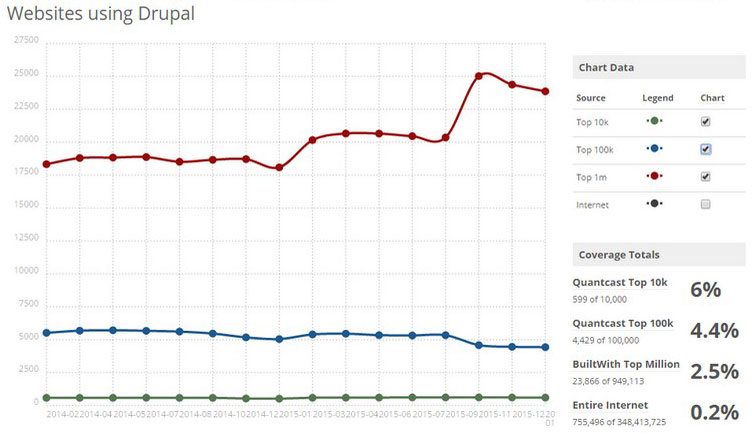
Keep in mind that in these charts, WordPress is measured on a completely different scale than the other two, ten times larger in fact.
Going with the consensus is often a good thing in terms of tech adoption. In this instance, large scale adoption means more robust support, a much larger pool of plugins and themes to choose from, and much lower likelihood that your website will become obsolete anytime soon and require a complete rebuild from the ground up. How many sites do you still see built on Flash in 2016? Also consider that the site you’re reading right now has existed on WordPress more or less in the same state for over 10 years now. A website that has to be continually rebuilt from scratch is oftentimes treated as a completely new website in the eyes of Google’s indexing bots. Crawling through a website built on WordPress is like cutting open a tree and counting the rings inside: a more detailed history than you’d ever need.
Every so often, we get a call from a client (most of the time a restaurant) asking “can’t we do anything about bad reviews on ( insert site name here)” and the answer is sure, but, you have to worry about it all the time, not just when it suits you.
The first and best solution is to be proactive. Make sure you ask if your customers are satisfied several times. In fact, we often recommend that you print directly on your guest check “If you aren’t satisfied, don’t pay until you’ve talked to a manager”
An ounce of prevention is worth ten tons of headaches after they leave and trash your place. The sad thing is, it doesn’t even have to be true- and people will believe it. A client, a local pizza shop had someone say “the chicken wasn’t cooked- still raw” which is impossible, since all his chicken is pre-cooked. Another restaurant got a bad review by a guy who wrote in a reasonable tip on his charge, then came back in demanding a refund for his $5 beer with a $1.34 tip which he claimed was a $1 more than it should have been, and wanted $10 back in cash. The part he left out- he also called the cops to try to settle his dispute. And these are “reviewers”?
One restaurant in San Francisco decided to ask its customers to write 1 star bad reviews on Yelp- and even gave a discount to people who panned them. This article includes some of the reviews:
Botto Bistro is encouraging all of its customers to leave one-star Yelp reviews; it is even offering deals for anyone who pens a crummy review: 25% off any pizza and a chance to win a cooking class. (Hat-tip to Richmond Standard.)
Chefs and co-owners Davide Cerretini and Michele Massimo are veterans of the local dining scene, and say that their food is excellent and they run a busy restaurant. According to Cerretini, they simply grew tired of the constant advertising inquiries from Yelp and what he dubs “blackmailing” and review manipulation. (Sidenote: A judge recently ruled that Yelp has the power to manipulate reviews.)
Source: Richmond restaurant encourages bad Yelp reviews – Inside Scoop SF
Yelp doesn’t just review restaurants, so you might want to check what people have said about your business there.
Other sites you may be getting reviewed on: Facebook, Trip Advisor, Foursquare, Zomato (formerly UrbanSpoon) and Google. Google has a mechanism to ask for reviews to be reviewed- but it’s a little tricky to find your way there, so here’s a video guide.
Again, the best way to avoid bad reviews- excellent customer service. And, if people seem really happy, ask them to write an amazing review for you.


